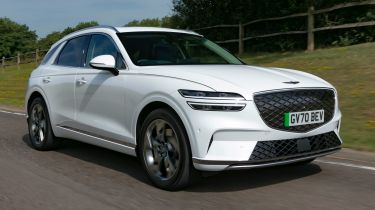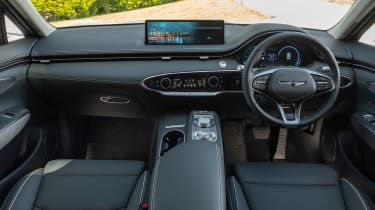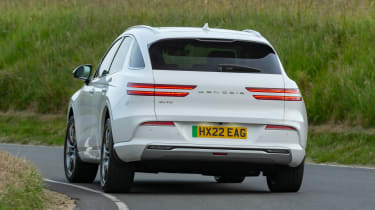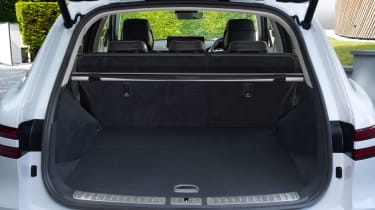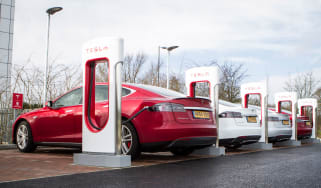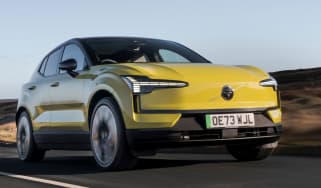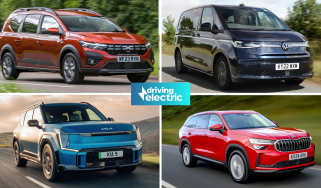Genesis Electrified GV70 review
The fully electric Genesis GV70 SUV quickly asserts itself as one of the best cars in its class
Pros
- Incredibly refined
- Advanced tech
- Powerful
Cons
- No cheaper entry-level models
- Uninteresting to drive
- Expensive consumables
| Car type | Range | Wallbox charging time | Rapid charge time |
|---|---|---|---|
| Electric | 283 miles | 8hrs (0-100%, 11kW) | 18mins (10-80%, 240kW) |
While it may be gaining traction, Genesis is still a relative bit-part player in the UK car market. Launching in 2021 with a range of petrol and diesel models, its electric cars have started to trickle through; the Electrified GV70 is a rival for cars like the BMW iX3 and higher-spec versions of the Volvo XC40 Recharge, while also stepping on the toes of mid-size premium alternatives such as the Audi Q8 e-tron and Mercedes EQC.
Genesis is the posh option in the Hyundai group, and as such, the GV70 uses much of the electric knowhow found on cars like the Hyundai Ioniq 5 and Kia EV6 – despite sitting on a different platform. Completing a trio of electric cars, the GV70 joins the G80 saloon and GV60 coupe-SUV in the maker’s ever-expanding zero-emission portfolio.
The electric version of the GV70 is marked out by a glam faired-in grille, 20-inch alloy wheels in an exclusive design, and a cleaner rear bumper since there’s no need for exhaust pipes. The name helps the Electrified GV70 stand out as well, even if it is a bit of a mouthful.
Interior feel is certainly as good as rivals, with high quality materials and a largely user-friendly layout. The only thing we’re not particularly taken by is the silver dashboard trim, which looks a bit dated and doesn’t fit with the general upmarket feel of the rest of the cabin.
The brand’s customer service promise exceeds what we’re used to, though. In what the brand calls the ‘Genesis Difference’, you get your very own personal assistant who guides you through the ordering process, before later booking in servicing and a courtesy car for you. When it’s time for a service, your car will be collected from your home and dropped off afterwards, for free. The GV70 also comes with a five-year/50,000-mile Care Plan consisting of breakdown assistance and servicing, plus a five-year warranty with unlimited mileage.
An additional perk, which might be especially appealing amid rising electricity prices, is a result of Genesis’ partnerships with Shell Recharge and IONITY. Buyers get a five-year subscription to the IONITY network and preferential 24p/kWh rates (it’s 74p/kWh usually), which is actually cheaper than the average home tariff (as of June 2023).
The Electrified GV70 is one of the few cars on sale that can make proper use of ultra-rapid chargers like those provided by IONITY, too. Charging speeds of up to 240kW are among the very fastest of any current production car, and Genesis claims a 10-80% top-up is achievable in just 18 minutes. In our experience, that’s barely enough time to use the facilities and grab a coffee before being back on your way, which could be a game changer for those covering big miles up and down the country.
The 283-mile range is competitive and, importantly, we found it was relatively easy to get close to that figure in normal driving. We found it to be more efficient than an EQC in colder weather, too. Charging at home via an 11kW wallbox is possible, though even using a more common 7kW supply should be possible in under 12 hours.
As is often the case, you’ll need to pay a high-ish price for all this technology and luxury. The Electrified GV70 starts from over £64,000, which is a bit more than what you might pay for many of its rivals. It also wears bespoke Michelin tyres, so punctures may turn out to be expensive and irritating.
Another reason prices are a little on the high side is because there’s no entry-level model for the time being. As it stands, Sport trim is your only option and all versions come with a 77.4kWh battery and a dual-motor powertrain with almost 500bhp and 700Nm of torque. That means it’ll do 0-62mph in just 4.2 seconds – faster, we think, than is strictly necessary in a car like this.
You don’t get the feeling that you’re getting all the power straight away, but press the accelerator harder and the GV70 surges forward with urgency. Slowing down isn’t quite as sudden; the adjustable regenerative braking seems to ramp up slowly when you lift off – we found it less aggressive and less binary than in some EVs.
But like in a Rolls-Royce or a Bentley, having more power than you need only adds to the luxury experience. The GV70 is quiet and refined in almost all situations, though a clear focus on comfort means it’s better suited to motorway journeys than it is cross-country back-road blasts. In our experience, the soft suspension showed it to have less composure than something like an Q8 e-tron, with the Genesis showing a tendency to roll through corners and even feel a little soft and unsettled over speed bumps. This, despite it possessing tech that scans the road for imperfections to mitigate any jolts that might otherwise make themselves known inside the cabin.
Our test car featured the Innovation Pack for around £3,500. Among items such as a head-up display, remote parking assist and blind-spot monitoring, it adds active noise cancelling. It’s hard to tell if this is responsible for removing any motor whine – we’d need to drive one without the pack equipped to see – but, as mentioned, the GV70 is very hushed.
Technology is a strong point for the Genesis Electrified GV70. Infotainment functions are accessed through a large 14.5-inch touchscreen, which offers the latest smartphone connectivity and a host of live functions. All cars get a crystal-clear reversing camera, which is handy because rearward visibility isn’t great. Overall equipment levels are generous, though, meaning overall the GV70 does stack up as a premium car.
That continues when you consider the rear-seat and boot space. Head and legroom is plentiful and the boot is a good size, at 503 litres, even if that’s 39 litres short of the petrol and diesel models. Still, it’s only seven litres shy of what you get in a BMW iX3 and there’s even a 25-litre storage area under the GV70’s bonnet, which is perfect for charging cables.
As it is, the Genesis Electrified GV70 is a pretty strong premium SUV with some unique plus points. On price alone it pips the latest Audi Q8 e-tron, while interior quality and charging tech only cement its place close to the top of this class. However, we’re holding out for single-motor versions, which might offer more range and will be better value-for-money for buyers who don’t need four-wheel-drive.

